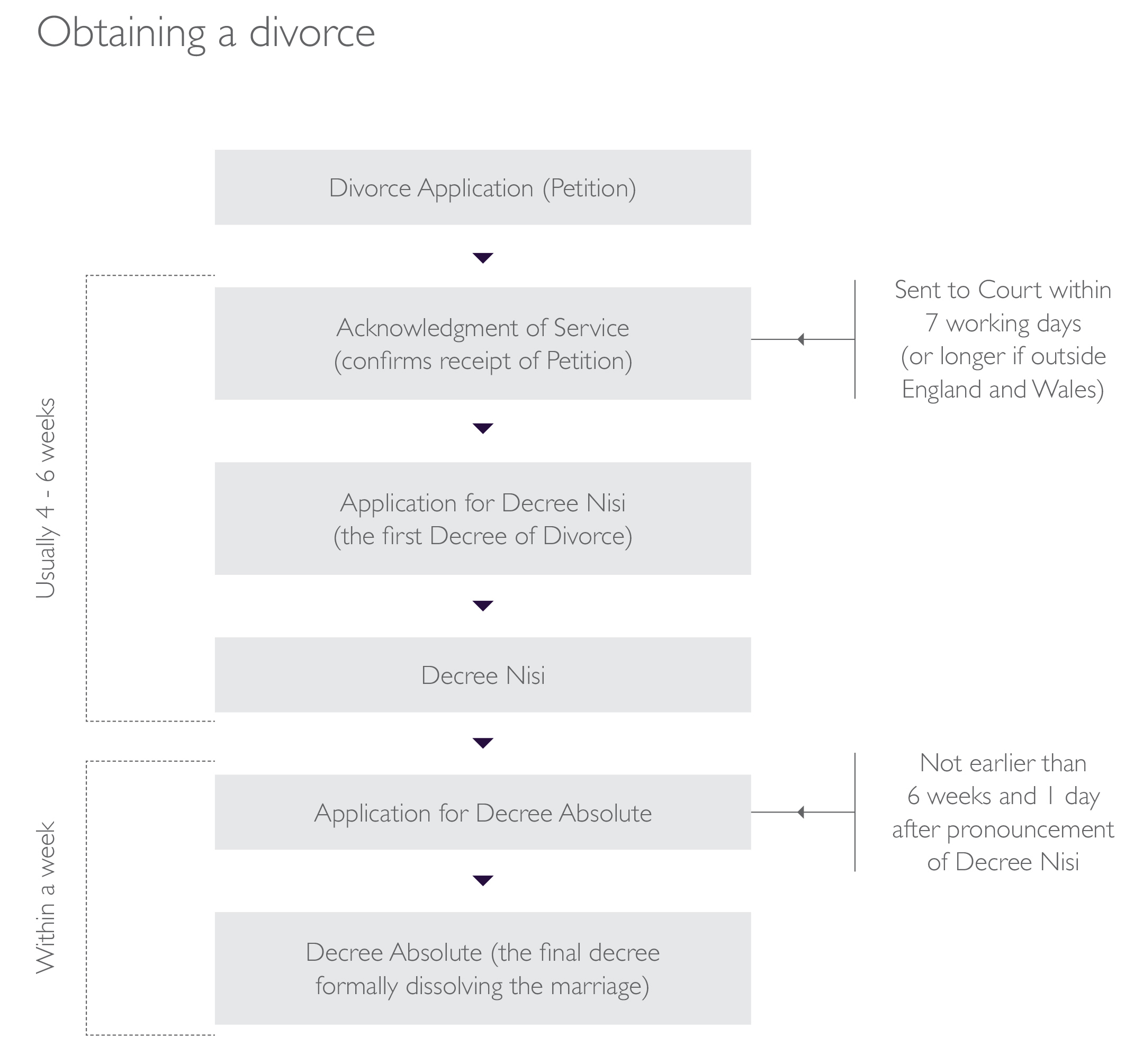Going through a divorce can be one of the most stressful experiences of a person’s life. When someone decides to end their marriage, the situation can be less daunting once they are aware of the process. In this article, Associate Ellie Hampson-Jones and Trainee Solicitor Ben Waller offer a guide on how to get a divorce.
Basic requirements
A couple must have been married for at least one year in order to obtain a divorce in England and Wales.
The court has to be content that this country is the right place for the divorce. This is most straightforward when both parties live here full time (i.e. they are ‘habitually resident’ here) or are both domiciled here. Habitual residence is the place where a person’s life is mainly based. It is also possible for the court to have jurisdiction in other scenarios depending on the habitual residence and/or domicile of each of the parties.
Jurisdiction can be a complicated issue and if you or your spouse has connections to other countries you should take legal advice.
The ground for divorce
The one ground for divorce in this country is that the marriage has irretrievably broken down.
Our divorce system is, at the moment, ‘fault-based’, although the Divorce, Dissolution and Separation Bill is currently working its way through parliament. This will remove the need for fault or blame to be attributed to one party.
Until the Bill is passed, the ground for divorce is proven by establishing one of the following five facts:
- Heterosexual adultery.
This must be formally admitted by the respondent. It is not possible for a party to issue a divorce on the basis of their own adultery. The divorce must take place within six months of discovery of the adultery. This is an area of the law which regrettably lags behind societal progress, as it only covers heterosexual adultery. - Unreasonable behaviour.
This is the most commonly relied upon fact. It encompasses any behaviour a party can no longer endure, which has led to the breakdown of the marriage. This can cover a wide spectrum of behaviour such as a failure to provide affection or attention, alcohol/substance abuse, financial disagreements, domestic abuse, unfaithfulness or cruelty. This need not be admitted by the other party. The courts will tend to look for between three and six examples of behaviour. Practically, homosexual adultery could be referred to by the petitioner when describing the other person’s unreasonable behaviour. - Desertion.
For this fact to be proven, the respondent must have left the petitioner, without their agreement or good reason, for a continuous period of at least two years immediately before the petition is issued. This is rarely relied upon as it is technical and other facts can be used instead when the parties are living apart. - Two years separation with consent.
This fact must be agreed by the respondent. The parties need to have lived apart for a continuous period of at least two years immediately before the petition is issued. It is possible for parties to be deemed to be ‘living apart’, even if they still live under the same roof. - Five years separation.
This fact does not need to be agreed by the respondent. The only requirement is that the parties must have ‘lived apart’ for a continuous period of at least five years immediately before the petition is issued.
Applying for a divorce (by post)
The petitioner spouse must file the divorce petition at court, which will then serve it on the respondent spouse. The information required in the petition includes details of the parties and their solicitors (if instructed), the date of marriage, the fact relied on (with supporting information) and confirmation as to whether the petitioner intends to apply for a financial order. The original marriage certificate, or a certified copy, will also need to be provided.
If solicitors are involved, they often try to agree the contents of the petition before it is issued, to reduce the potential for acrimony.
Applying for a divorce online
In May 2018, a new service was introduced to enable litigants in person to conduct their divorce online. It allows users to file their petition, upload supporting evidence and pay fees using the service. It also guides users through each stage of the process while using plain, non-technical language.
Since summer 2019, 80% of litigants in person have chosen to process their divorce using this method.
The way forward
Once a petition is served, the receiving party, (the respondent), will need to acknowledge it formally using a document called the Acknowledgment of Service.
Decree nisi
If the divorce petition is acknowledged and not defended, the petitioner can then apply for decree nisi. This is the first stage in the two-stage decree process. It is an acceptance by the court that it has jurisdiction to dissolve the marriage. Decree nisi is pronounced in open court, but attendance by the parties is not needed. The parties are not formally divorced at this stage; they remain married until the final order, the decree absolute.
Decree absolute
Six weeks and a day following the pronouncement of Decree Nisi, the petitioner has the right to apply to the court for Decree Absolute. The respondent is not able to apply for Decree Absolute until four and a half months after the pronouncement of Decree Nisi. If over a year has passed between Decree Nisi and an application for Decree Absolute, reasons for the delay will need to be given in a statement attached to the application.
It is only upon Decree Absolute being granted that the parties are formally divorced. This often takes place after the financial order has been implemented, as it could have detrimental implications to be divorced before a financial settlement is reached. For further details on this point, legal advice should be taken.
Finances and children
Many people are surprised to discover that in the majority of cases, the reason for the divorce has no impact on the finances or children matters.
Parties may try and find agreement on these areas through direct discussions, mediation, or with the help of their solicitors. The ideal aim is to use whatever process is appropriate to obtain settlement as quickly, cost-effectively and amicably as possible.
A recent article for Mindset Magazine summarises the alternatives to the court process and our “Alternatives to court” page here provides more information about arbitration, collaborative law and mediation.
If an agreement cannot be reached and court proceedings are issued in relation to the finances and/or the children, these will be separate processes from the divorce proceedings (and from each other).
To find out more about the ‘Court process’ see our page here.
Finances
The starting point in the division of assets is 50/50. However, the court can use its discretion in determining the outcome. The court will consider the financial needs of each party and the resources available. Parties may choose to disclose their financial information voluntarily. However, if an application is made to court to decide the outcome, both parties will be required to give full and formal disclosure of all their assets, liabilities and income.
For more information on ‘Financial provision in Divorce’, see our page here and for a cautionary tale regarding failure to make financial disclosure in divorce, see our article here.
Private children (ie non-care/local authority proceedings)
The law will not automatically intervene to regulate contact arrangements with children unless there is a dispute between the parties and one party makes an application to the court. In the vast majority of situations, parents are able to reach an agreement on the best interests of the children without requiring legal assistance (although often mediation can be a useful forum for facilitating an agreement). If there is a dispute, either parent can make an application under the Children Act 1989 to decide where the child lives and the time spent with each parent.
For more information on ‘Arrangements for children’ see our page here.
Summary
A divorce free from dispute can take as little as four to six months. However, any disagreement about the reasons for divorce or, more commonly, about the arrangements for the children or the division of the finances can extend and complicate this process.
Stewarts are the pre-eminent divorce and family practice in the UK, ranked No.1 in both The Legal 500 and Chambers. If you need advice about your divorce, our expert family lawyers can help guide you through the process to achieve the best possible outcome both in relation to children and finances.
You can find further information regarding our expertise, experience and team on our Divorce and Family pages.
If you require assistance from our team, please contact us or alternatively request a call back from one of our lawyers by submitting this form.
Subscribe – In order to receive our news straight to your inbox, subscribe here. Our newsletters are sent no more than once a month.








